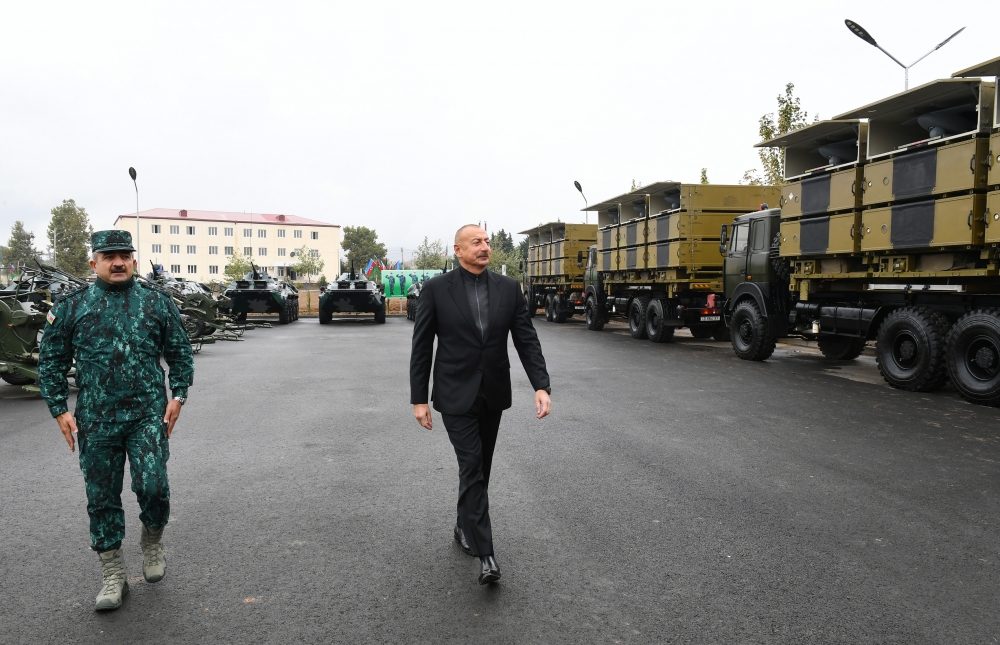Azerbaijani President Ilham Aliyev has described Iran's allegations about the presence of the Israeli forces in the country's territories as “baseless”.
"We are showing good intentions. But this does not mean that we will accept baseless accusations against ourselves. I am saying this to the Azerbaijani people and the whole world here in Jabrayil, on the banks of the Araz River, that all baseless accusations against us will not remain unanswered," President Aliyev said during his visit to the southern district of Jabrayil on October 4.
The president’s response came after some Iranian government officials had voiced their concern about the alleged presence of Israelis along the border between Iran and Azerbaijan.
President Aliyev also referred to earlier remarks of Iran's Ardabil Friday Prayer Imam Ayatollah Seyyed Hasan Ameli who criticized the joint exercise by Azerbaijan, Turkey and Pakistan, calling on Iran's Islamic Revolution Guards Corps to hold maneuvers near the Azerbaijani border in order to show Iran's power.
"Some Iranian provincial mullah recently opened his mouth and fabricated slander against Azerbaijan. When I was informed, I said not to pay attention," President Aliyev said.
"Then, unfortunately, some government officials started making unfounded accusations against us – Azerbaijan has allegedly brought Israel to these regions. Let them open their eyes wide and look. Where did they see Israel here? Not a single person lives here. There is no building here. Is there evidence? No. If there is no evidence, everyone should be held accountable for what they say. We cannot allow anyone to fabricate baseless slander against us," the Azerbaijani president stressed.
President Aliyev also said that Azerbaijan “does not sue countries that have close and friendly relations with Armenia”, adding that “deep inside we may be worried about this, this may hurt us, especially when neighboring countries are particularly active in relations with Armenia, but we never say that."
Iran has recently accused Azerbaijan of "allowing foreign forces to be present in the region". On October 1, Iran launched a large-scale military exercise near its border with Azerbaijan which was reportedly meant as a message to its arch-enemy Israel.
Relations have soured between the two countries over the past few weeks following illegal trips by Iranian lorries to certain parts of Azerbaijan's Karabakh (Garabagh) region, where the Russian peacekeeping forces are temporarily deployed. On August 11, Iran’s ambassador to Azerbaijan received a Note Verbal from the foreign ministry in addition to an earlier verbal notification about Baku’s dissatisfaction with the illegal transit of goods to the Karabakh region.
However, the verbal notification and Note Verbal were ineffective in settling the controversy. Around 60 Iranian trucks illegally traveled to Azerbaijan’s Karabakh region from August 11 to September 11. The trucks moved from Iran to Armenia, then to the Karabakh region via the Lachin corridor. On September 15, Azerbaijan detained two Iranian truck drivers for illegally crossing into the territory of Azerbaijan.
In an article published on October 3, Iranian hardline newspaper Javan called for the establishment of an Iranian military base in southern Armenia to "calm down the turbulence to the north of the Araz River".
Javan's article comes after Iran's Supreme Leader Ali Khamenei warned neighboring countries against reliance on foreign forces to ensure their security, saying that "the events that are taking place in the northwest of Iran, in some neighboring countries, should be resolved with the same logic of avoiding the presence of foreigners".
Azerbaijan has repeatedly denied Iran's allegations of the presence of "third forces" in the country.
"In general, the existence of any forces in the territory of Azerbaijan, including terrorist elements, that could pose a threat to our state or neighboring countries, cannot even be a subject of discussion. Unfortunately, during the 44-day war [between Armenia and Azerbaijan in the Karabakh region], some parties made such completely baseless claims. We stated then, and we reiterate now, that such allegations are baseless and no evidence has been presented to the Azerbaijani side so far," the Azerbaijani Foreign Ministry said in a statement on October 4.
Armenia and Azerbaijan have long been at odds over the latter’s Karabakh (Garabagh) region. On September 27, 2020, the decades-old conflict between the two countries spiraled after Armenia’s forces deployed in the occupied Azerbaijani lands shelled military positions and civilian settlements of Azerbaijan. During the counter-attack operations that lasted 44 days, Azerbaijani forces liberated over 300 settlements, including the cities of Jabrayil, Fuzuli, Zangilan, Gubadli, and Shusha, from nearly 30-year-long illegal Armenian occupation. The war ended in a tripartite statement signed on November 10 by Armenia, Azerbaijan, and Russia. Under the statement, Armenia also returned the occupied Aghdam, Kalbajar, and Lachin districts to Azerbaijan.
The tripartite agreement addressed the temporary deployment of a Russian peacekeeping contingent comprising 1,960 servicemen, 90 armored personnel carriers, and 380 units of an automobile and special equipment in certain parts of Azerbaijan’s Karabakh region, including the city of Khankendi.







 The number of evacuees from flooded areas in Kazakhstan has reached 97,852 people, including about 32,856 children since March 27.
The number of evacuees from flooded areas in Kazakhstan has reached 97,852 people, including about 32,856 children since March 27.
 The Islamic holy month of fasting, Ramadan comes to an end this week with the celebration of a joyous festival called Eid (meaning “festival” in Ar...
The Islamic holy month of fasting, Ramadan comes to an end this week with the celebration of a joyous festival called Eid (meaning “festival” in Ar...
 Iran's senior military leaders described the drone and missile attack on Israel on April 14 night as “successful".
Iran's senior military leaders described the drone and missile attack on Israel on April 14 night as “successful".



